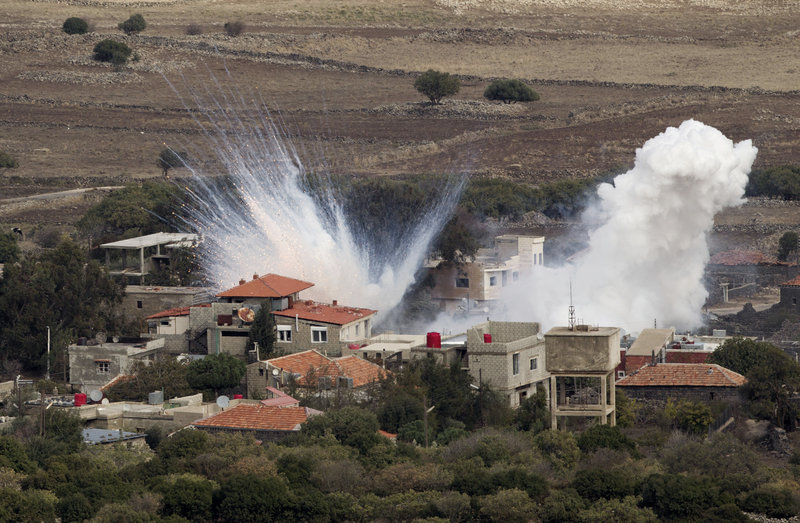TEL HAZEKA, Golan Heights – Israeli tanks struck a Syrian artillery launcher Monday after a stray mortar shell flew into Israel-held territory, the first direct clash between the neighbors since the Syrian uprising began nearly two years ago.
The confrontation fueled new fears that the Syrian civil war could drag Israel into the violence, a scenario with grave consequences for the region. The fighting has already spilled into Lebanon, Jordan and Turkey.
“We are closely monitoring what is happening and will respond appropriately. We will not allow our borders to be violated or our citizens to be fired upon,” Prime Minister Benjamin Netanyahu said Monday in a speech to foreign ambassadors.
While officials believe President Bashar Assad has no interest in picking a fight with Israel, they fear the embattled Syrian leader may try to draw Israel into the fighting in a bout of desperation. Israeli officials believe it is only a matter of time before Syrian rebels topple the longtime leader.
On Monday, a Syrian fighter jet bombed a rebel-held area hugging the border with Turkey three times, killing 15 to 20 people, according to a Turkish official. Separately, eight wounded Syrians died in Turkey, the official said.
Potential Israeli involvement in Syria could be far more explosive. The bitter enemies both possess air forces, tanks and significant arsenals of missiles and other weapons.
Although the Israeli military is more modern and powerful, Syria has a collection of chemical weapons that could wreak havoc if deployed. Fighting between the countries could also drag in Syria’s close ally, the Lebanese guerrilla group Hezbollah, or Islamic militant groups in the Gaza Strip on Israel’s southern flank.
Israeli political scientist Dore Gold, an informal adviser to Netanyahu, said neither Israel nor Syria has any interest in escalating the fighting.
“I see no indication of Assad wanting to draw Israel in. But if violence comes from the Syrian army, or even forces operating in Syria that are affiliated with al-Qaida, Israel has to do what is necessary to make sure there’s no spillover into Israeli territory,” he said.
He described Israel’s reaction Monday as a “carefully calibrated response.”
“On the one hand, it shows Israel’s determination to protect its civilians, and at the same time, it indicates it doesn’t want to get drawn in,” he said.
Israel has warily watched the fighting in Syria for months, carefully trying to avoid any involvement. It has found itself in a difficult position as the fighting rages near the frontier with the Golan Heights, a strategic plateau it captured from Syria in 1967 and later annexed.
A number of mortar shells have landed in the Golan in the past week. Early this month, Syrian tanks accidentally crossed into a buffer zone along the frontier for the first time in nearly 40 years.
Israel responded for the first time Sunday, firing what it called a “warning shot” into Syria after a mortar shell landed near an Israeli military post.
In Monday’s incident, the military said it reported “direct hits” on a mobile artillery launcher after another shell struck the Golan. It would not say whether the launcher belonged to the Syrian army, saying only it had targeted the “source of fire.”
The Israeli military believes the mortar fire is spillover from internal fighting in Syria and not aimed at Israel. But officials say they are beginning to question that assessment after repeated breaches of the frontier.
Israel has little love for Assad, who has provided refuge and support to Israel’s bitterest enemies through the years. But he and his father before him have kept the frontier quiet for nearly four decades, providing a rare source of stability in the volatile region.
Israel fears Assad may stage an attack if he fears his days are numbered. It worries that Syria’s chemical weapons could fall into the hands of Hezbollah or other anti-Israel militants. There also are concerns that al-Qaida-linked groups battling Assad could turn their focus toward Israel, or sectarian warfare might send refugees streaming into Israel.
Send questions/comments to the editors.



Success. Please wait for the page to reload. If the page does not reload within 5 seconds, please refresh the page.
Enter your email and password to access comments.
Hi, to comment on stories you must . This profile is in addition to your subscription and website login.
Already have a commenting profile? .
Invalid username/password.
Please check your email to confirm and complete your registration.
Only subscribers are eligible to post comments. Please subscribe or login first for digital access. Here’s why.
Use the form below to reset your password. When you've submitted your account email, we will send an email with a reset code.